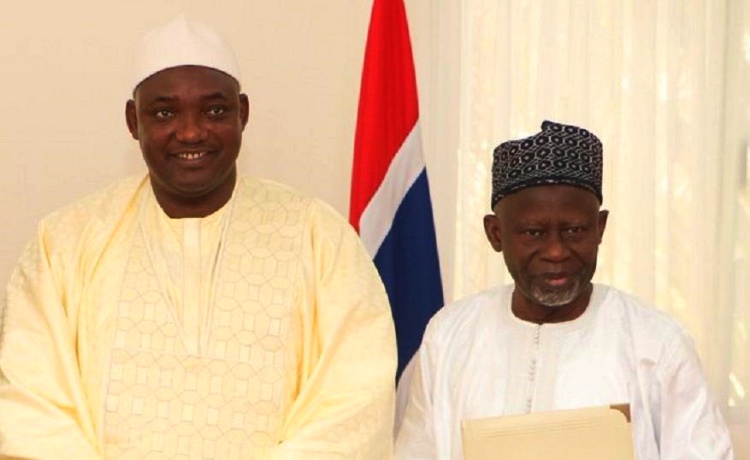Gambiaj.com – (BANJUL, The Gambia) – A new opinion poll by The Gambia Participates has revealed a shifting political landscape ahead of the 2026 presidential election, with both President Adama Barrow and veteran opposition leader Ousainou Darboe facing widespread resistance, while United Democratic Party (UDP) mayor Talib Bensouda is emerging as the most promising new contender.
Barrow: Third-Term Fatigue Setting In
The poll found that 55% of Gambians do not want President Barrow to seek a third term, with only 35% in favor and 10% undecided. If he were to run, 60% of respondents said they would not vote for him, with support concentrated mainly in Basse and Kanifing, while rejection dominates in urban areas such as Brikama, Kerewan, and Banjul.
Generationally, Barrow’s biggest challenge lies with the youth: voters aged 25–44 overwhelmingly reject his candidacy, signaling fatigue with his leadership despite the government’s reforms in access to information and anti-corruption. His strongest, though still limited, backing comes from older Gambians.
Darboe: A Veteran Facing Rejection
For Ousainou Darboe, the UDP leader and long-standing opposition figure, the findings are equally sobering. 58% of Gambians believe he should not contest in 2026, compared to just 28% in support. Only 18% say they would vote for him, while 63% reject him outright.
Darboe’s limited support lies mainly in Mansakonko, Kerewan, and Janjanbureh, but he faces strong rejection in politically strategic urban centers like Kanifing and Brikama.
Like Barrow, his generational challenge is stark: younger Gambians show little enthusiasm, with the 25–34 group expressing the highest opposition to his candidacy.
Gender dynamics compound his difficulties, with men showing stronger resistance than women. The data underscores that Darboe, despite his stature, is struggling to inspire both youth and older voters, raising serious questions about his political viability in 2026.
UDP Succession: Talib Bensouda Leads, Yankuba Trails
The question of who succeeds Darboe within the UDP appears clearer. The poll shows Talib Bensouda leading decisively with 44% support as the preferred successor, while Yankuba Darboe garners 13% and Banjul mayor Rohey Malick Lowe 5%.
Bensouda’s appeal is strongest among younger and middle-aged voters (25–44) and among men, though women remain more hesitant. Regionally, his strongest backing comes from Banjul, Basse, and Kuntaur, while Brikama and Kanifing are more skeptical.
For Yankuba Darboe, the numbers highlight his limited reach. His support never rises beyond 4% in any age bracket, showing recognition but not broad popularity. He appeals slightly more to men than women but lags far behind Bensouda in national standing.
Talib Bensouda: A Rising Cross-Party Contender
Beyond UDP succession, the poll shows that half of Gambians (50%) believe Talib Bensouda should run for president regardless of party affiliation, with only 20% opposed. His cross-party recognition positions him as the strongest new-generation challenger.
Bensouda’s candidacy resonates most with urban youth and middle-aged voters, while older Gambians remain less convinced. A gender gap is also visible, with men showing stronger enthusiasm than women.
His coalition prospects also appear promising: 55% of Gambians believe a Bensouda-led alliance with Essa Mbaye Faal and Mama Kandeh could win 2026. Within such a coalition, Bensouda is the preferred leader (38%), far ahead of Kandeh (14%) and Faal (12%).
The Bigger Picture
Despite rising discontent with Barrow and Darboe, the poll still places Barrow as the perceived frontrunner for now, with 31% believing he stands the best chance of winning in 2026, compared to 18% for Bensouda and 12% for Darboe. However, the high share of undecided voters (29%) underscores a volatile and fluid race.
The findings confirm that 2026 will be a generational contest. Barrow and Darboe are both weakened by voter fatigue, while Bensouda is seen as a fresh alternative with the potential to transcend party lines. Yet with Yankuba Darboe and others trailing, the succession debate within the UDP remains crucial.
The chairman of the Brikama Area Council, Yankuba Darboe, responded to the forecasts by denouncing the Gambia Participates poll and bluntly urging his supporters to ignore them.
He used a report from the Center for Policy Research and Strategic Studies (CEPRAS) before his election as chairman of the Brikama Area Council to support his suspicion of polls. Despite the CEPRASS report’s estimates of an even share of the vote cast, Yankuba Darboe then urged his followers to ignore the poll, saying he would confidently defeat NPP’s Seedy Ceesay.
As The Gambia heads into one of its most competitive elections, the outcome may hinge on whether Bensouda can consolidate his youth-driven support base, whether Barrow can sway undecided voters, and whether Darboe steps aside to avoid splitting the opposition’s vote.










